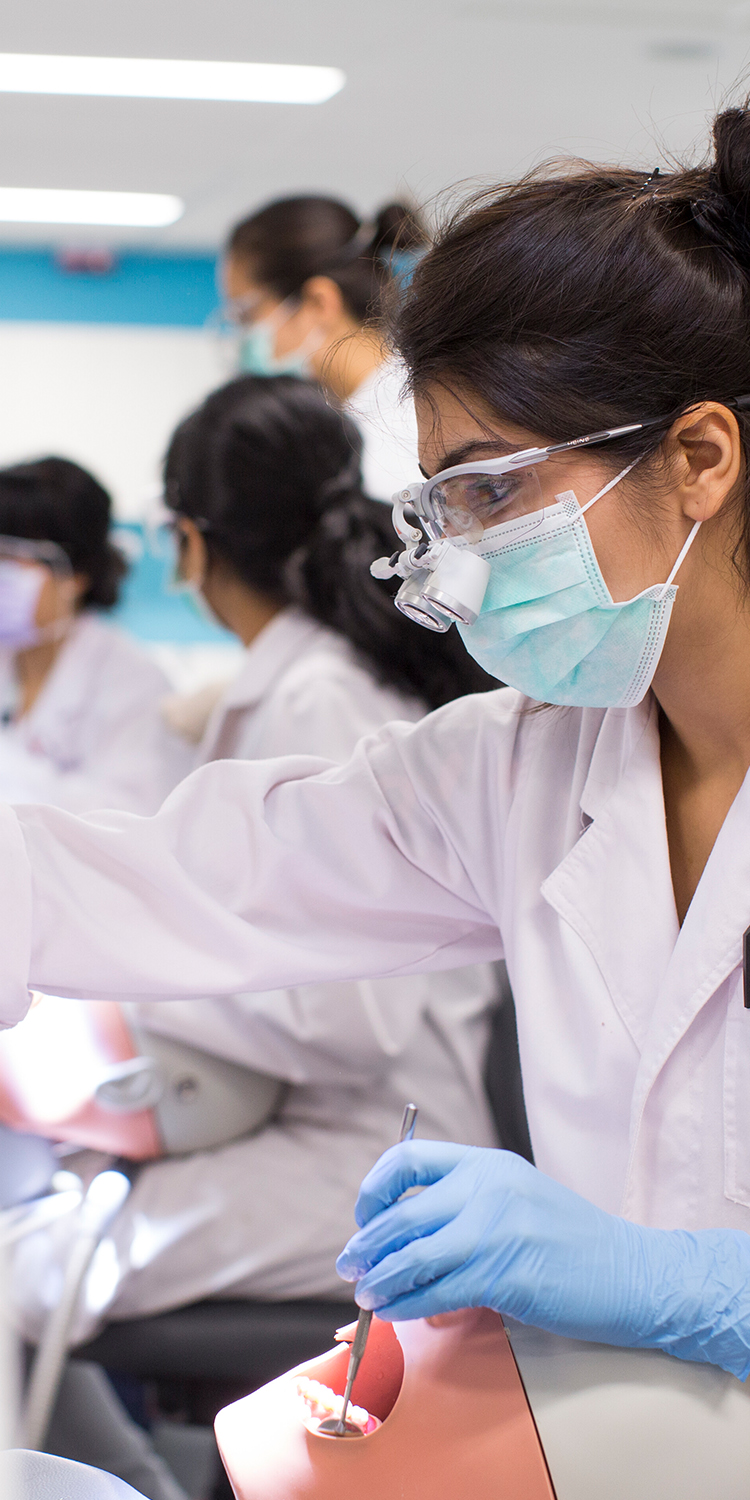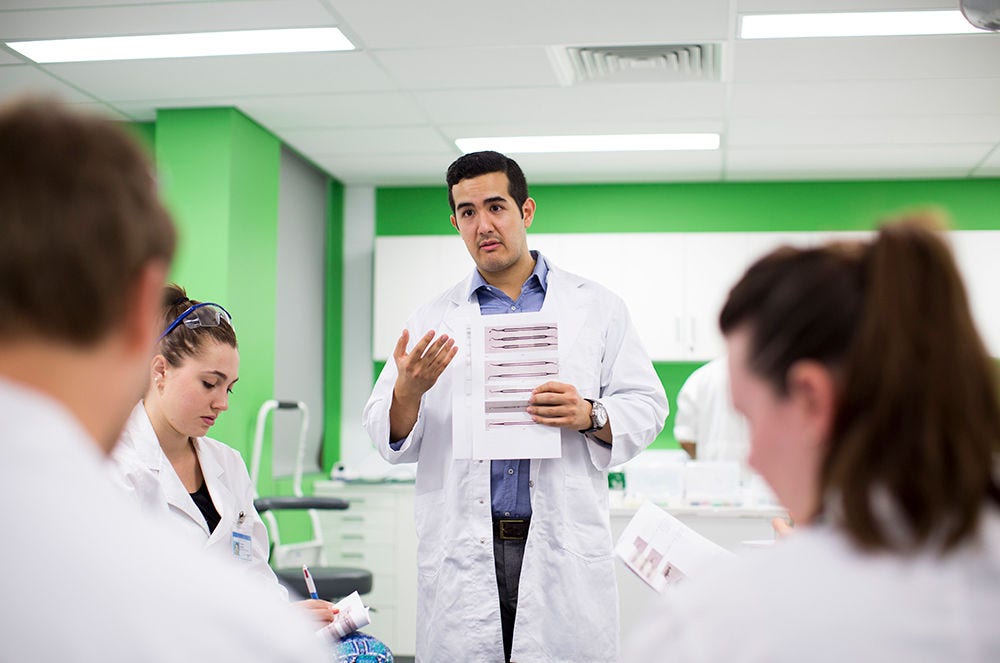Inherent requirements are the fundamental parts of a degree that must be met by all students. They are the abilities, knowledge and skills you need to complete the degree. Students with a disability or chronic health condition may have adjustments made to enable them to meet these requirements. There may also be other considerations, such as cultural or religious considerations, that may impact on your capacity to meet an inherent requirement, and so may require adjustments. However, any adjustments must not fundamentally change the nature of the inherent requirement.
All students must fulfil the inherent requirements of the Bachelor of Dental Surgery or Bachelor of Oral Health degree they are undertaking. While reasonable adjustments can be made, these adjustments cannot compromise academic integrity. It is the student's responsibility to check all the requirements of courses, and consider the effects of any medical condition or disability on their ability to complete the degree requirements. If you have any questions, contact our Future Student Enquiry Team.
There are eight categories of inherent requirements in the Bachelor of Dental Surgery and Bachelor of Oral Health programs, which are as follows:
- ethical behaviour
- behavioural stability
- legal obligations
- communication
- cognition
- sensory abilities
- strength and mobility
- sustainable performance.
Ethical behaviour
Demonstrates knowledge and engages in ethical behaviour in practice.
Students demonstrate:
- a high degree of professionalism and ethical behaviour, including academic integrity and maintenance of patient confidentiality
- familiarity with, or knowledge of, the Dental Board of Australia's Code of Conduct for Practitioners, and adherence to its guidelines
- familiarity with, or knowledge of, Adelaide Dental School’s Undergraduate Handbook, and adherence to the academic policies and procedures outlined in it
- familiarity with, or knowledge of, the South Australian Dental Service Induction Handbook, and adherence to the policies and procedures outlined in it.
Behavioural stability
Demonstrates behavioural stability to work constructively in a diverse and changing academic and clinical environment.
During your studies (and professional careers) you will be exposed to a range of unexpected and emergency situations. Responding appropriately to these situations, and providing safe and effective care, will require personal resilience and a consistent, sustained level of physical and mental performance.
As a student, you will need to demonstrate the:
- ability to be receptive, and respond appropriately, to constructive feedback
- ability to effectively cope with your emotions and behaviour when dealing with individuals in the clinical setting capacity for self-awareness to monitor your own health and wellbeing.
Legal obligations
Students must demonstrate knowledge and compliance with Australian law, professional regulations and scope of practice.
Communication
Dentistry and oral health studies require the ability to understand and respond to verbal and non-verbal communication accurately, appropriately and in a timely manner, and the capacity to construct coherent written communication appropriate to the circumstances.
Students must demonstrate:
- effective communication and interpersonal skills
- empathy and concern for people
- effective teamwork skills - collaborate effectively with peers
- a willingness to seek advice/assistance from peers, staff and University services as required
- the ability to apply learning to the clinic situation
- ability to provide a caring, therapeutic approach to the needs of all persons, regardless of gender, race, sexuality or religion.
Cognition
Dentistry and oral health studies require the ability to integrate and implement knowledge (including evidence based decision-making) in practice.
Students must demonstrate:
- high-level organisation
- a commitment to continuous learning
- a willingness to critically appraise and reflect
- leadership abilities, including shared leadership
- problem-solving skills
- the ability to apply and integrate knowledge, as opposed to rote learning
- the ability to locate, summarise and review the quality of information from commonly available academic resources in a planned and timely manner
- proficiency in the use of current technologies that support learning.
Sensory abilities
Sufficient visual acuity is necessary to demonstrate the required range of skills, through the performance of relevant tasks and assessments whilst maintaining consistent, accurate and safe care to self and others.
Students must demonstrate:
Strength and mobility
Students must have the ability to perform gross motor skills to function within the scope of practice.
Students must demonstrate:
- effective fine and gross motor skills
- the ability to interpret and integrate 2D and 3D perspectives attention to detail.
Sustainable performance
Dentistry and oral health studies require a consistent and sustained level of physical energy and concentration to complete a specific task in a timely manner, while maintaining consistency and quality of performance, throughout the designated period of duty.
Students will:
- attend and actively participate in all learning activities (28-38 hours per week (contact time)
- spend approximately 20 hours per week outside class time studying, preparing for clinic/simulation and laboratory activities, and revising and reflecting on performance.
Reasonable adjustments for students with disabilities
Adelaide University strongly supports the right of all people who wish to pursue studies in our institution to achieve their potential and chosen career objectives. The school is committed to making reasonable adjustments to teaching and learning, assessment and other activities to address the impact of students' disabilities so that they can successfully participate in their degree.
Students who have impaired function in their hands or arms, or significant audio/visual impairment, will have difficulty pursuing these degrees. It is highly advisable for any prospective student with such a disability to contact Adelaide University to discuss the issue prior to application.
Students with disabilities for whom reasonable adjustments are required for them to undertake their program, should contact our Future Student Enquiry Team before the commencement of the first semester. Some adjustments need up to 4-8 weeks lead time to organise, so it is imperative that early contact is made. In some instances, more advance notice is needed (e.g. one year prior to commencement of the degree/year, as clinic rosters and placements are organised in the previous year).
To support potential and current students' decision-making, the inherent requirement statements specify the course requirements of the entry-level Dentistry or Oral Health degrees for student admission and progression. The statements embrace the ethical, behavioural, legal, communication, cognitive, sensory, strength and mobility, and sustainability aspects associated with the professional practice of an Australian-registered dentist or oral health therapist.
If you are intending to enrol in the Bachelor of Dental Surgery or Bachelor of Oral Health degree, you should review these inherent requirement statements and consider whether you may experience challenges in meeting them. If you think you may experience challenges related to your disability, chronic health condition or any other reason, you should discuss your concerns with our Future Student Enquiry Team.










